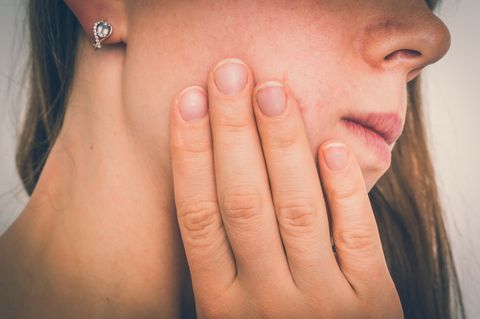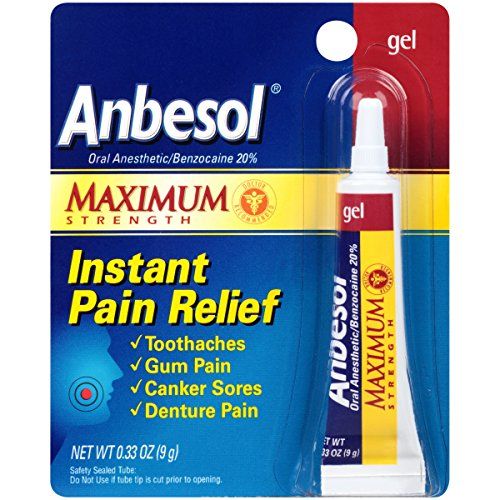Good News: Canker Sores Aren’t Contagious

Mouth pain is a bitch, no matter how it shows up.
But yeah, a canker sore—which is basically an open ulcer—is definitely near the top of the list of things you don’t want showing up in your oral cavity.
First, the good news: Canker sores and cold sores are not the same thing. “Cold sores are caused by the herpes virus and are true infections,” says Edward A. Alvarez, D.D.S., a cosmetic dentist in New York City. Canker sores, on the other hand, are not—which also means they’re not contagious.
First of all, whew. But then that begs the question…
What exactly are canker sores?

Canker sores—which are also called aphthous ulcers—are small, round sores that pop up on the inside of your mouth, according to the U.S. National Library of Medicine. The sores will usually have a red edge and a gray center.
They typically appear on your inner cheeks or inside the lips, says Philip Gallegos, D.D.S., a dentist in Albuquerque, NM, but they can show up on the back of your throat, too.
So yeah, they’re annoying (and painful) AF, but, good news: Canker sores are benign, non-contagious, and very common, says Elisa Mello, D.D.S., a cosmetic dentist at NYC Smile Design.
What are the symptoms of canker sores?
Basically, you’ll know when you have one. The first sign of a developing a canker sore is typically a tingling feeling in a certain spot, says Gallegos—kind of like a cold sore.
That spot then turns into a red bump that eventually reveals a white or gray center, says Gallegos. The sores typically end up being about one to three millimeters in length, and can occur in clusters or as a single lesion.
Oh, and they’re also pretty damn painful (I mean, they are ulcers, after all). Some more serious ulcers may even leave scarring behind.
What causes canker sores?
Honestly, tons of things. For one, they occur in response to trauma inside the mouth—such as biting the side of your cheek or bumping your gum hard when brushing, says Alvarez.

Mouth appliances, such as braces, mouthguards, and retainers, can all irritate the lips, cheeks, and gums, causing canker sores, too. “This is especially true if the appliance doesn’t fit properly,” says Mello. If you have a mouth appliance, be sure to tell your dentist or orthodontist if you frequently develop cankers in areas where the appliance rubs or pokes the inside of your mouth, she suggests. So yeah, don’t just live with it.
Stress and poor diet can also play a role canker sores, since both can affect how your immune system functions, says Mello. Though it’s not entirely clear why, according to the American Academy of Oral Medicine (AAOM), a lag in the immune system might cause your body’s white blood cells to attack the mucosal tissue (a.k.a., the soft, slimy part) in your mouth, which in turn, might cause canker sores.
And if you’re a woman, hormones can come into play, too: “Progesterone increases during the menstrual cycle and can cause canker sores and red, swollen, or bleeding gums,” says Bryan Simone, D.D.S., a dentist in Grove City, Ohio—that’s something he sees a lot of in his practice.
Okay, so how do I treat a canker sore?
Canker sores are self-limiting, according to the AAOM—that means they can typically heal on their own without any treatment within one to two weeks.

That means you probably won’t have to go see a dentist or doctor, says Simone. In the meantime, an over-the-counter topical medication like Anbesol can help numb the area and reduce the pain, Simone says (any topical treatment containing benzocaine will do, though). For another at-home treatment, Gallegos also suggests dabbing a few drops of milk of magnesia on the sores three to four times a day.
But if you’re desperate for more immediate relief—or if your sores are excruciatingly bad—go ahead and make a dentist appointment. Alvarez uses a certain type of laser that coats the surface of the ulcer, forming a protective layer on top that stops pain immediately. You can also ask your doctor to prescribe a topic anesthetic, such as viscous lidocaine or a topical steroid, that can coat the sore and reduce inflammation, and works harder than an OTC treatment, Alvarez adds.
Keep track of your diet while you’re on the mend, too: “Avoid spicy and salty food, citrus fruit, nuts, or tomatoes, all of which may irritate the open sores,” Gallegos says. Instead, stick to foods that are easy to chew and swallow, like yogurt, soups (not too hot!), and cottage cheese, he suggests. Cold liquids and foods, like ice cream or Popsicles, might also bring some relief.
One thing to keep in mind, though: If you have recurrent canker sores—frequent outbreaks or new sores that develop before old ones totally heal—you’ll want to talk to your primary care doctor about those, as it could signal another underlying health issue like inflammatory bowel disease or a gluten sensitivity, says Gallegos.
But, if you’ve got one or two rogue canker sores, you may just have to wait it out…and for god’s sake, don’t poke it with your tongue!
Source: Read Full Article



